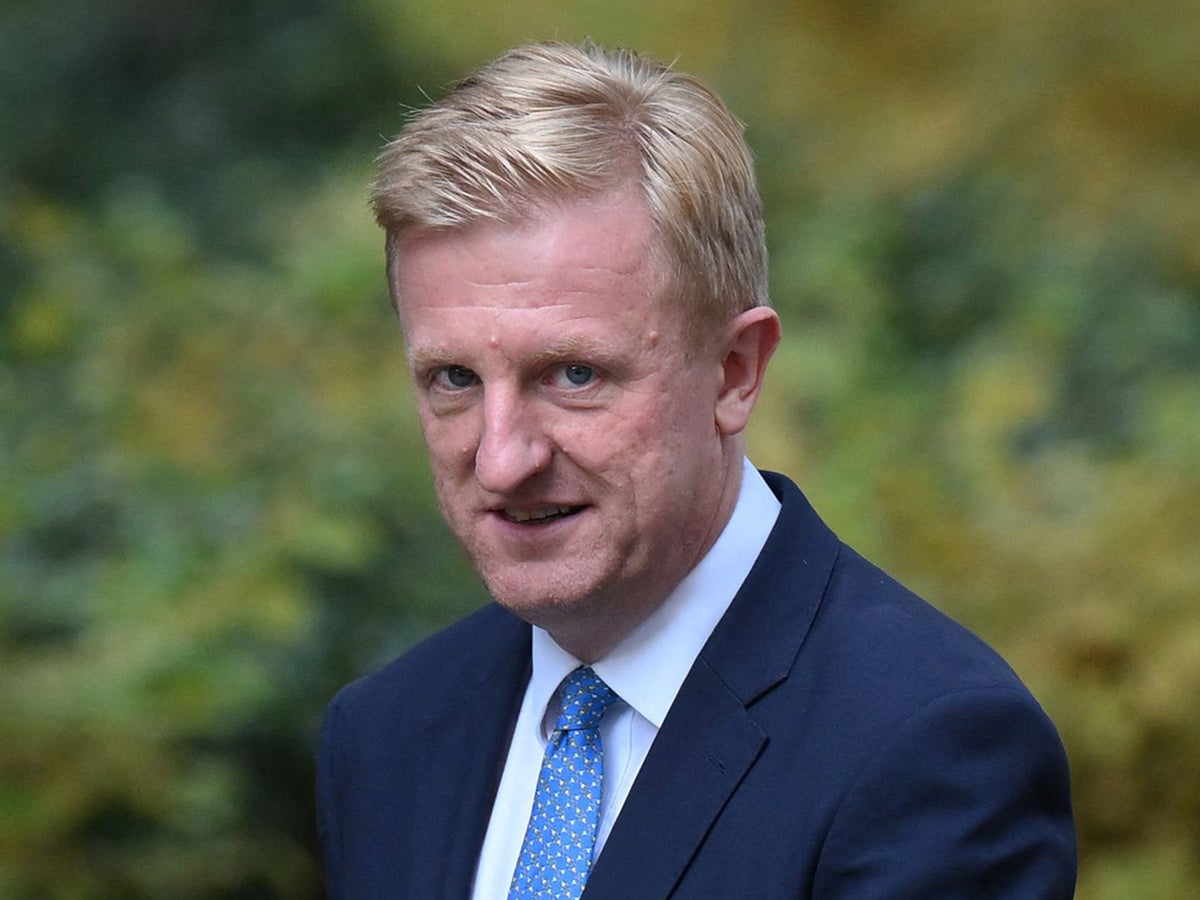
Some in the Conservative Party are calling it an “Olive branch”.
Rishi Sunak has sought to restore order after the resignation of his deputy prime minister in a bullying scandal by calling on one of his closest allies in politics.
Oliver Dowden – affectionately known as Olive to his Tory friends – is the prime minister’s new deputy, appointed just hours after Dominic Raab quit the cabinet.
Despite early expertise in the attacking form of political communications that once led to comparisons with Alastair Campbell, Mr Dowden is known as one of the “nice guys” of politics. Regarded as a safe pair of hands, one of his jobs will include acting as a government spokesman when a crisis erupts.
It is no coincidence that his mild-mannered style is the antithesis of that of Mr Raab, who today criticised the bullying inquiry that led to his resignation as a “Kafkaesque” saga, and suggested civil servants had tried to force him out of office.
Like Mr Raab, Mr Dowden studied law, and went to Cambridge, but, unlike many of his Tory colleagues, he attended a local state school in Garston, Hertfordshire.
He is well-liked among Tory MPs, although there is some jealousy over his closeness to the prime minister.
But he was tipped for high office even before he became an MP, when he was working as a highly respected aide to David Cameron. Another aide who worked with him inside Downing Street for four years said he thrived in the role of Cameron’s fixer on day-to-day issues. He was “always calm”, he added.
His foray into the culture wars did occasionally cause some Tory MPs to shake their heads, such as when he made a name for himself waging war on the National Trust and attacking “woke psychodrama” including the West’s supposed “obsession” with pronouns. But many believed it was genuine and not just a way to please the then prime minister, one Boris Johnson.
Friends believe the sign of how respected he is across the party can be seen in his longevity even as the party has been led by wildly different characters. “Look how he has served for so many PMs,” one said.
He is seen as one reason why Mr Sunak has restored competence after chaos of the Boris Johnson and Liz Truss eras.
Unglamorous behind the scenes, he is an operator at the heart of government.
When he worked for Cameron one colleague said: “He was brilliant, even though no one had heard of him.”
Defence minister Alex Chalk was appointed to replace Mr Raab in his other cabinet role as justice secretary.
For Mr Chalk it is a significant promotion and means he moves from the Ministry of Defence, where he was in charge of procurement, to take on the much more high-profile role of leading the Ministry of Justice.
Both he and Mr Dowden have long been close to Mr Sunak and it was little surprise when both got jobs in the new administration following the short-lived tenure of Liz Truss.
Mr Chalk, who was elected in 2015 to represent Cheltenham, is no stranger to legal matters. A trained barrister, he is a former solicitor general for England and Wales and has been a prisons and probations minister.
He and Mr Sunak are also both Old Wykehamists, former pupils at Winchester College, and Mr Chalk was among the ministers who joined the large-scale resignation that helped spell the end of Mr Johnson’s premiership.
He will take on responsibility for prisons, courts and a host of other issues including his predecessor’s controversial Bill of Rights plan.
Many working in the criminal justice system are breathing a sigh of relief at the appointment of Mr Chalk to succeed Mr Raab.
He previously served as solicitor general until he resigned during the meltdown of Boris Johnson’s government last July. Mr Chalk went on to back Rishi Sunak’s leadership campaign.
He is not believed to be an enthusiastic supporter of his predecessor’s Bill of Rights, and his appointment could be the final death knell for the controversial law.
In his July resignation letter, Mr Chalk spoke of his work on new domestic abuse laws and the delivery of legal advice, and praised the “talented civil servants” he worked with in the Ministry of Justice and Attorney General’s Office.
Mr Chalk is a barrister and was practicing as recently as last year, with his chambers profile saying he “prosecuted and defended in the most serious cases, including terrorist bomb plots, international fraud, multi-handed rape cases and murder”.
Labour’s shadow justice secretary Steve Reed congratulated Mr Chalk but pointed out that he is the 11th Conservative to fill the post in 13 “chaotic years”.
Charity the Prison Reform Trust said Mr Chalk’s appointment is an “opportunity for a reset” on Mr Raab’s “damaging” changes to the parole system. “The vital and complex work of the Ministry of Justice has been undermined by Dominic Raab’s reckless meddling and his inability to interact professionally with his senior officials,” chief executive Pia Sinha said.
The Law Society urged Mr Chalk to urgently “get a grip” on the “crumbling courts system”.
The reshuffle comes hours after Mr Raab resigned from Rishi Sunak’s cabinet following an inquiry into bullying allegations against him.
Elsewhere, James Cartlidge took Mr Chalk’s old job in the Ministry of Defence, while Gareth Davies was appointed exchequer secretary to the Treasury.
Mr Raab’s resignation also came as science minister Michelle Donelan was set to begin her maternity leave. She will be replaced by backbench MP Chloe Smith, who was the work and pensions secretary under Liz Truss.
The reshuffle will also see John Whittingdale return to the government as a minister in the Department for Culture, Media and Sport as well as the Department for Science, Innovation and Technology.







